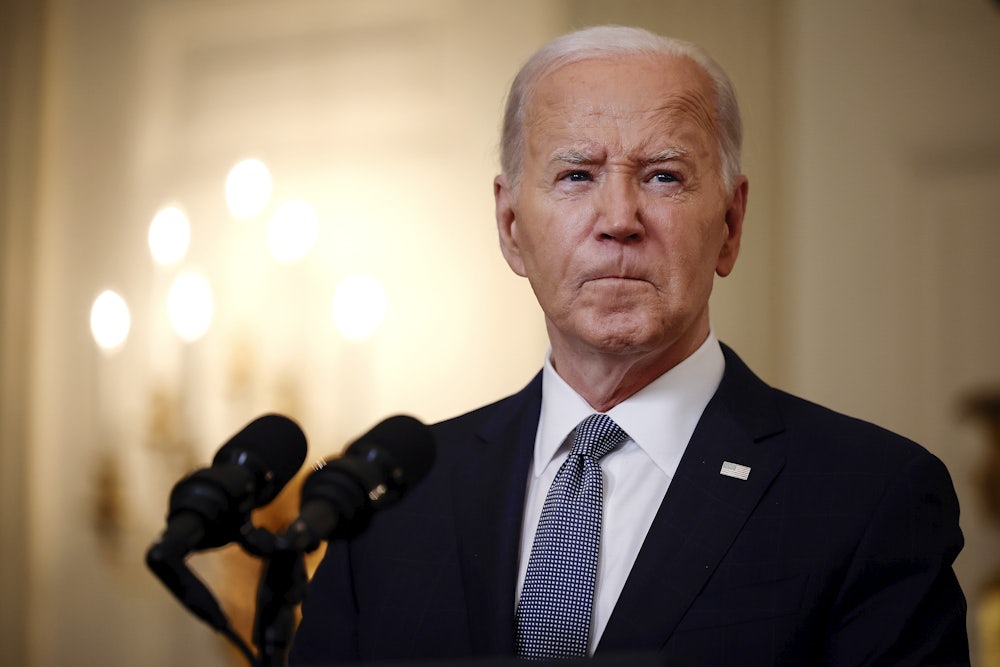Nothing in recent months has stirred Democratic passions like the magic words “convicted felon Donald J. Trump.” Most Democrats embrace a simple strategy for weaponizing the 34-count verdict from a dingy Manhattan courtroom: Shout it from the rooftops. Hire town criers. Emulate the bullhorn tactics of the Republicans by constantly screaming, “Guilty. Guilty. Guilty.”
On Saturday, The New York Times reported, “Post-verdict interviews with more than 50 Democrats … revealed a party hungry to tell voters that Mr. Trump’s conviction makes him unfit and worried that Mr. Biden might not use the bully pulpit of the presidency to press that argument.” Here at The New Republic, our editor, Michael Tomasky, argued on Monday, “No federal Democratic officeholder should, for the foreseeable future, say the name ‘Donald Trump’ without putting the words ‘convicted felon’ before it.”
Color me skeptical.
After years of Trump avoiding retribution for just about everything—including inciting an insurrection on January 6, 2021—Democratic euphoria over the long-awaited guilty verdict is understandable. But a close election, with the future of America democracy on the line, is not the moment to follow the 1960s mantra “If it feels good, do it.” A consistent danger in politics is preaching to the choir while neglecting the swing voters in the back pews.
There remains major ambiguity about the long-term effects of the Trump conviction on the horse-race numbers. What is unequivocal, however, is that almost all low-information voters have heard something about the verdict. A Morning Consult Poll, conducted at the end of last week, found that only 3 percent of registered voters had entirely missed the news about Trump’s legal fate, while another 9 percent admitted they had not heard much about trial. That means that 88 percent of the electorate are reasonably knowledgeable about Trump’s status as a convicted felon.
What Democrats fear is that memories of the guilty verdict will fade with the election still five months away. But even without the Biden campaign saturating swing states with convicted-felon TV ads, voters will still receive constant reminders that Trump was found guilty on all 34 counts. The June 27 CNN debate will undoubtedly feature a series of questions about the verdict—and none of them will be targeting Joe Biden. Trump’s sentencing hearing on July 11 will prompt banner headlines, even if the former president avoids the slammer. And at the Republican convention in Milwaukee, beginning July 15, Trump is almost certain to devote a large portion of his acceptance speech to his festival of grievances as he rails against his “rigged” trial and conviction.
The worst thing for the Democrats would be to turn Trump’s conviction into a purely partisan issue. The jury verdict will have much more credibility with up-for-grabs voters if they are reminded of the details by the news media and postings on social media. What would be more persuasive: a Kamala Harris speech denouncing the convicted felon or a bulletin on your iPhone or TV screen revealing the details of Trump’s sentencing? Biden aggressively attacking Trump as a convicted felon in every speech only bolsters the former president’s bogus charge that the entire case was a political “witch hunt” concocted in Washington.
Part of the Democrats’ love of aggressive tactics in giving Trump a scarlet F for “Felon” is the belief that MAGA high-decibel diversions always work. Yes, they had a powerful impact in 2016 in portraying Hillary Clinton as a would-be criminal for her mishandling of her emails as secretary of state.
But Trump’s track record since the 2016 election suggests that a nonstop torrent of lies is not necessarily a winning strategy. As president, Trump’s approval rating never hit 50 percent. You might also recall that the Democrats gained 40 House seats in the 2018 off-year elections and that Trump himself was defrocked as president in 2020. For all of Trump’s bleating about the unfairness of his having been tried in Manhattan rather than Alabama for an offense that occurred in New York City, there is scant evidence that this smoke screen of duplicitous rhetoric is working. A CBS News Poll released over the weekend found that 56 percent of independents believe that the Trump jury reached the “right verdict.” Yes, Republicans currying favor with Trump can scream that a Manhattan jury is worse than a North Korean tribunal, but this over-the-top oratory is convincing no one other than the MAGA faithful.
Biden’s reluctance to come out swinging against the Trump verdict is widely interpreted as the 81-year-old president’s hidebound failure to understand that the rules of politics have changed since he was in the Senate. But there is another more plausible interpretation. The Biden campaign has a polling infrastructure that is far more sophisticated than the surveys sponsored by the media and public polling organizations. Horse-race numbers, particularly at this stage, are far less important to the Biden campaign than survey data about how best to politically frame an argument. Biden’s public restraint may be far more shaped by the campaign’s polling numbers than the president’s personal reluctance to go after a convicted felon who has taken over the Republican Party. Two years ago this month, after the Supreme Court repealed Roe v. Wade, pundits brooded that the Democrats were caught flat-footed and did not have an aggressive messaging strategy ready to deploy. But abortion has been a powerful and winning political issue on its own terms without having to largely depend on Democratic partisan talking points.
None of this is to argue that the Democrats should model their campaign around Thumper the Rabbit’s dictum: “If you can’t say anything nice, don’t say anything at all.” But shouting “convicted felon” every seven seconds is not a magic formula for winning the votes of undecided voters in Wisconsin and Pennsylvania. The Manhattan verdict is part of Trump’s legacy—along with January 6, threats of “retribution” against his enemies, Covid denial, threatened immigration roundups, and mendacity on a scale rarely seen since 1930s Berlin. Trump will pay a price for all this at the polls in November, as long as the Democrats avoid making everything a partisan issue.




